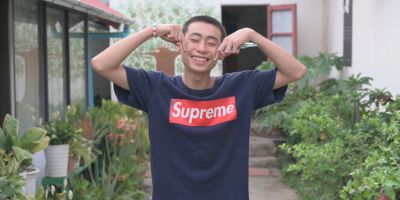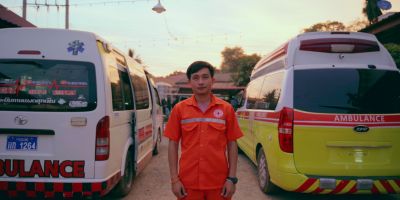Published 16th October 2023
(Trigger Warning: This article includes sensitive issues, such as suicide)
This article was written as part of a social media campaign in collaboration with Samaritans of Singapore Limited.
From society-driven campaigns, personal conversations, and surface-level or in-depth explanations — how should we be talking about mental health?
The conversation about mental health in Singapore is now more prevalent than ever. The long-term aim is to continue to aid these conversations in productive ways. Speaking to our profiles, we are going to learn more about suicide ideation and the dialogues that accompany it.
It is imperative we dispel the misconception that talking about suicide will lead to people dying by suicide.
As such, mental well-being remains a tricky issue to navigate. Locally, there is more than one suicide case daily and for every suicide, at least six survivors are left behind.
For three years in a row, suicide remains the leading cause of death for youths between 10 to 29 years old. Although breaking this pattern is no easy feat, professionals in the field are suggesting actions that can be taken on a personal and societal level, together with the unpacking of some issues they believe should be discussed more.
Why Am I Feeling This Way?
One of the many reasons we observe among youths is an overwhelming pressure to succeed academically, and society should understand that while being academically inclined can be good for some, it’s not the case for everyone. Associate Professor Suresh, the Scientist Module Lead of Mental Health in Nanyang Technological University (NTU), elaborated further on this by championing for more support on alternate careers and celebrating different ways of judging success. One example he cited was the School of the Arts (SOTA), founded in 2008, which was a big step forward in providing the space for people interested in the arts. However, there is still the push to do well academically because not everyone will become practitioners.
Another recent move by the government highlights the attempts at alleviating this stress on students and their families by removing all Primary and Secondary school mid-year examinations by this year. With mixed reactions from parents, including heightened stress on end-of-year examinations instead or feeling an increased need to send their children for private tuition, Singapore still has some way to go.
Who Can I Turn To? (Who Can I Be For Others?)
“Humans are social animals and so, maintaining a strong community is part of maintaining a good mental health”, said Professor Suresh. Friends and family can help recognise the symptoms of distress, when the person themself may seem unaware.
In fact, one crucial element emphasised by all of our profiles was listening. Professor Mythily Subramaniam said “You may not be the best person to support them”, but added that something as simple as suggesting that they could see a counsellor and hence offer companionship “can go a long way”. She is currently the Director of the Research Division and Lead Investigator of the Programme of Mental Health Policy Studies at the Institute of Mental Health (IMH).
Both professors acknowledge that the listener’s functioning may be affected as there is a potential to run the risk of high burden. Hence, while we can give them a listening ear, best without judgement, it’s still good to seek out trained professionals who can either provide support for the individual or assist the family.
Alternatively, services, such as peer-support groups in school organisations, could be an option for individuals as they appear “less threatening”, while trusting there is still a level of quality care. This level of fear is further alleviated for online-services, such as online messaging platforms, where there is no need for face-to-face interaction, added Professor Mythily.
What Can I Do to Help Myself?
A quick Internet search reveals a plethora of solutions that one can consider to improve their well-being and prevent themself from reaching the state of hopelessness. However, Professor Mythily remarks that it all boils down to the things we do everyday. She highlights that maintaining regular sleep and physical activity, possessing good social skills, developing the ability to maintain interpersonal relationships without getting upset, and turning to spiritual beliefs are just some ways that contribute to a healthy mental well-being.
All these healthy habits sound really simple but do have an effect and it’s a pity that most of us don’t do it in a constant manner, she added.
Sleep, especially, shouldn’t be underestimated.
In fact, Singaporeans are one of the most sleep-deprived worldwide. Sleep deprivation is particularly serious in Singapore as it contributes to “abnormally high stress levels and the inability to cope” with daily tasks, said Professor Suresh.
Insufficient sleep not only results in the feeling of lethargy, it also has biological consequences. This includes cardiovascular diseases, diabetes, obesity and depression. Hence, in order to prevent falling victim to these chronic health issues, getting adequate quality sleep at the right times is crucial for one’s health.
Building “good sleep habits”, or “sleep hygiene” can help us achieve the recommended seven hours of sleep daily. Two simple actions that we can start off with is to ensure that our bedroom is quiet, dark, relaxing, and at a comfortable temperature, as well as creating a relaxing bedtime routine, such as stretching or reading a book.
Moreover, it is understandable to have the tendency to use our smart devices before we sleep, since it can be part of our winding-down routine after a long day. However, we can always work our way towards reducing the time spent on our phone by gradually cutting down our usage each night before bed to help us attain better sleep.
When Is A Good Time To Start Seeking Help?
Well, there is no direct answer to this question.
We understand ourselves best - our mind, our body, our soul. When we feel something amiss within ourselves, we should further probe into what these thoughts are trying to tell us, whether it’s a sign to get some rest, share our troubles with a loved one or seek help.
Youths now are more knowledgeable than ever when it comes to mental health issues, like depression and anxiety, but when it comes to translating this understanding to action, there is a gap, remarked Professor Mythily. She unpacks this further into two possible reasons that she has observed.
One reason that people do not seek help early is the fear of informing their parents, worrying that they may get judgemental and be dismissive, due to the generational gap that may result in misunderstandings and inability to relate. For instance, youth today are often labelled as the “Strawberry Generation”, perceived as a generation that can’t withstand hardship and breaks easily under pressure, such as the fruit. However, reality simply proves a different set of circumstances and challenges for this generation with respect to their elders.
Label avoidance is also another issue that has instilled fear in youths today that barres them from getting help. Some fail to declare their mental health for fear that they will underperform with respect to their cohort, since people rarely associate academic excellence in work with mental health disorder, she said. This is particularly serious for Singapore with our work-driven culture.
“We all want to be happy and healthy forever,” said Professor Mythily, “It’s a big barrier for Singapore in prioritising productivity.”
Where Do We Go From Here?
Professor Suresh urges Singapore to consider re-evaluating their young childhood education. Instead of sitting around and doing things in their head, children should have more outdoor education, grouplay, exploring the world and early engagement with the external environment, he said.
Concerning psychological first aid, Professor Mythily believes that making it as readily available as CPR could also be a food for thought to strengthen Singapore’s battle against mental health issues. Although Singapore isn’t short of campaigns, she believes the value of the impact they have can be further appreciated, otherwise campaigns will simply come and go.
With the number of outreaches higher than pre-covid days, Singapore is progressing well. For last year's World Suicide Prevention Day (WSPD), SOS organised 'Spark the Change Festival', an event held at Palawan Green, Sentosa. This event included their 3KM #HowRU walkathon and a line-up of local musicians to bring our community together and raise awareness for individuals in crisis.
How Do We Know Things Will Get Better?
That’s hard to say but our profiles agreed that there have been more conversations about mental health, be it on the communal or individual level, which is definitely a good sign.
Suicide is preventable. And while a complicated subject with a seemingly taboo reputation, the increased conversations mark a good turning point in the journey towards suicide prevention.
As the government continues to make strides in various ways whether it be less emphasis placed on education or trying to raise more awareness in terms of mental health, there’s only so much they can do. It should still be the individual’s responsibility to take action, such as immersing themselves in workshops and building a supportive network.∎
If you are experiencing any suicidal thoughts or behaviours and require support, you are not alone, contact:
24-hour Hotline: 1767
24-hour CareText: 9151 1767 (via WhatsApp)



 Wee Kim Wee School
Wee Kim Wee School